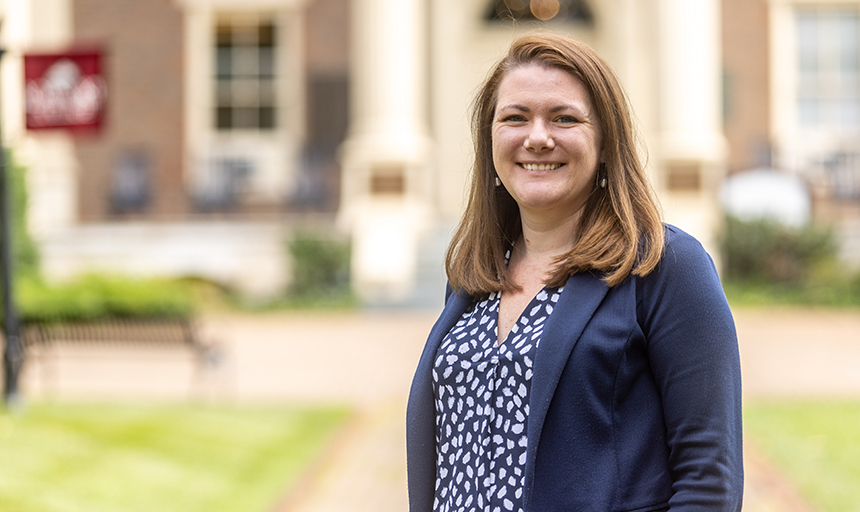Saoub selected for Science and Technology Policy Fellowship
September 20, 2022

Karin Saoub, the M. Paul Capp and Constance Whitehead Professor of Mathematics at Roanoke College, has been selected for the Science & Technology Policy Fellowship from the American Association for the Advancement of Science. Saoub is one of seven mathematicians among the 300 highly trained scientists in the organization’s 50th class of fellows who will help inform actionable, science-based policies throughout the U.S. government. Saoub has been placed as an adviser to the director of the Office of Science in the U.S. Department of Energy.
Selection for the program was based on an involved application process that included 13 interviews and a writing assignment to research a topic at the level of a 50-page scientific paper but condense it down to a short briefing memo. The fellowship will require similar projects that involve condensing and explaining science so it is informative but accessible to an audience of policymakers and elected officials.
Fellows like Saoub will learn firsthand about federal policymaking and implementation, while the U.S. government benefits from the contributions of highly trained scientists and engineers. Many of the policy hearings in Congress are supported by scientists like Saoub, who help agency staff prepare for hearings and other situations where they must testify before Congress or in the public arena.
“It’s really about building the bridges between science and policy,” Saoub said. “Meeting the other fellows has been inspiring. We may come from different backgrounds and stages in our careers, but we all have a passion to make better policy through science.”
I never imagined I would be learning about fusion energy, the muon g-2 experiment, and exascale computing performance. I am excited to contribute my skills to the DOE.
Karin Saoub, M. Paul Cap and Constance Whitehead Professor of Mathematics

Saoub has moved to Washington, D.C., for the academic year. She said she will miss her students, but she is looking forward to learning more about how math and science can help our government agencies, and she looks forward to supporting science in the national arena.
“In just a few short weeks, I have learned a tremendous amount about how our government operates, including how the various agencies are funded and prioritize initiatives,” she said, “as well as what projects fit under the umbrella of the Office of Science in the DOE. I never imagined I would be learning about fusion energy, the muon g-2 experiment, and exascale computing performance. I am excited to contribute my skills to the DOE.”
Saoub said the idea to apply for the fellowship came from one of her students.
“Several years ago, I worked with a student who came up with a project to look at how to use math to combat gerrymandering,” she said. “It was really interesting to think about how the skills that we teach in math could be useful in a broader sense. This broadened my own view of what I could do beyond teaching and my research. It was cool that something a student came up with has sort of shifted my focus years down the line. It will also help me to see more varied career paths for our math students.”
Fellows represent a full spectrum of disciplines, backgrounds and career stages.
“AAAS policy fellows have been demonstrating excellence in science policy for the past half-century, defining what it means to be a scientist and engineer in the policymaking realm,” said Rashada Alexander, Science & Technology Policy Fellowship director and alumna fellow. “In our 50th year of partnership with the U.S. government and many esteemed scientific societies and supporters, we are excited to usher in the newest class and follow their important contributions to policy, science and society.”